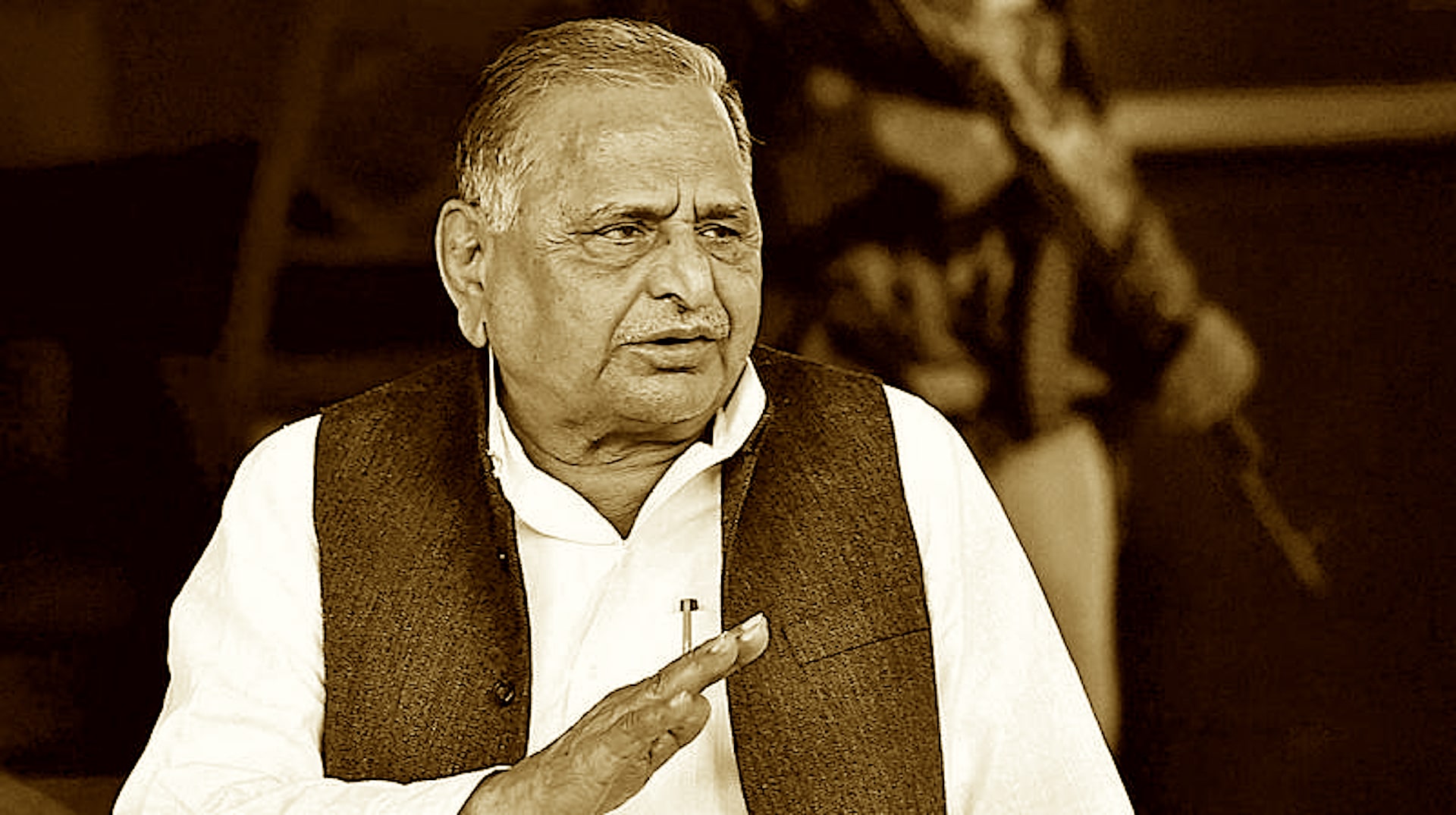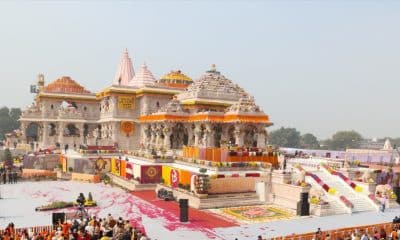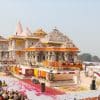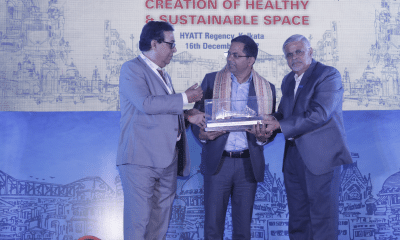Opinion
Mulayam Singh Yadav’s political legacy in UP will be hard to preserve
Mulayam Singh Yadav was cremated today in Saifai, Uttar Pradesh, his hometown, in the presence of his loved ones, admirers, and who’s who of national figures.
The Samajwadi Party founder’s defining moment for me was when I saw him stepping out of his automobile at a political gathering in Kasganj to meet a confectioner. This was not a political veteran meeting a potential voter; rather, it was a friend running into a friend from his humble beginnings.
Born in a humble family in 1939 in Etawah’s Saifai, the three-time Chief Minister of Uttar Pradesh and former Defense Minister of India rose to power only because of his extensive connection to the grassroots. In 2004, he almost single-handedly saved the United Progressive Alliance (UPA) government from falling down after the left parties initiated a trust vote and withdrew support after Manmohan Singh agreed to the India-US nuclear deal. The government would have collapsed if it had gotten five fewer votes.
A postgraduate from Agra University and a teaching assistant, the small-town wrestler-turned-politician rose quickly in influence due to his political savviness, in-depth knowledge of caste dynamics, his role in the socialist movement of JP – for which he spent 19 months in prison – but most importantly, the lessons in social engineering he learned from his mentor, Ram Manohar Lohia.
Yadav was elected president of the Lok Dal in 1980; the party afterwards merged to become the Janata Dal. In 1982, he was chosen as the opposition leader and served in that capacity till 1985. Yadav founded the Krantikari Morcha party after the Lok Dal party broke apart, and later the Samajwadi Party.
Despite having significant political clout, he would almost always managed to remember the names of at least fifty individuals from practically every district in the state. “If you were to meet him and introduce yourself, he would ask about the health of an elder from your town or perhaps your neighbourhood and give their name without delay. He had a sharp memory,” said Samajwadi Party spokesperson and Member of Legislative Council, Udayveer Singh, who spoke with The Plunge Daily over the phone. This memory and and the ability to remember people was probably a major factor in him becoming one of the longest-serving leaders of India’s most populous state.
“I won’t be able to talk to you for long as we are bringing his body to his residence in Saifai. Thousands of people from all over the world have poured in. As we can’t take in so many people at his home, the funeral would take place at the ground where he used to organize the Saifai Mahotsav,” added Singh. An annual event organized at an unprecedented lavish scale, Saifai Mahotsav, became his boon and bane. Many of his opponents cited this as favouritism – excessively using public money in places where his party was dominant. But Saifai, of course, loved him. “I remember the time when Saifai was just farmland where nobody wanted to stay or even visit. It now has a medical college, hospital, stadium and educational institutions. Why won’t people love him?,” Singh asks.
His hometown of Saifai in Etawah, as well as the nearby district of Mainpuri, frequently sent him to Parliament, and he reciprocated the favour. Saifai had the broadest roads, a 24-hour power supply, and industrial development when SP was in power – something that most of UP still lacks.
Udayveer recalls the time when Yadav first became the chief minister and went to his childhood elementary school in Saifai. “He wanted to go to some hostels, but there was no vehicle at the school to take him. In an old ambulance that a party worker had procured, he finished his visit. There was no one who was as tolerant, courteous, and respectful of others.”
One thing that also defined his career was his utmost commitment to the idea of communal harmony and secularism – now a much maligned term in Indian politics. In 1990, Yadav was chief minister when ordered the police to fire upon karsevaks who had congregated in Ayodhya to bring down the Babri Masjid – something which later led to his opponents in the Bharatiya Janata Party and its affiliates, giving him the sobriquet of ‘Mullah Mulayam’. But he insisted that he was working to uphold law and order and keep the state peaceful.
Qamar Alam, the Chairman of Women and Child Welfare Board in Uttar Pradesh, and an old associate of Yadav, remember his response when the town of Ganjdundwara in Etah district faced communal riots after a visit by right-wing leader Uma Bharti. “When we brought the matter to him, he listened to all the parties without bias and instructed the police to quell the riots. I advised him to instruct district units of the party to organise amity meetings to further dialogue between communities. By the next month, he began working on the same. For me, if a Chief Minister listens to your suggestions, it is an honour,” he said.
Qutub Alam, a member of the party in Etah, recalls how when his uncle was late for a meeting, he rebuked him by taking his name publicly. “He took notice of everyone and interacted with them on a personal level. It was almost like he had a personal connection with everyone.” He adds that Yadav stressed on marginalized communities like OBCs, Yadavs and Muslims to create their own leadership. “The reason that he brought Azam Khan into the fold was that he wanted someone from the Muslims community to bring forward their grievances in the Parliament.”
Yadav also faced numerous controversies during his decades-long political career. Many eyebrows were raised when, in response to a rape incident in the state, he made a troubling statement. “Boys will be boys, and they will make mistakes… “Will you hang them for rape?” he asked the press. Another flaw, which his son and subsequent Chief Minister Akhilesh Yadav worked hard to correct, was his aversion to new technology. As someone who gained popularity by providing free bicycles to the poor, he was opposed to the introduction of computers in India during Rajiv Gandhi’s regime. His son, on the other hand, later distributed free laptops and smartphones.
His decision to name Akhilesh as his political heir sparked a lot of infighting within the party. Qamar Alam claims that instead of passing the baton to Akhilesh, he should have gone through a democratic process. “The people on the ground aren’t as emotionally connected to Akhilesh as his father,” he says. Many political pundits, however, point to this decision as something that maintains the Samajwadi Party as a political force to be reckoned with in Uttar Pradesh even as their main regional rival, the BSP, has failed to find a suitable political heir to its leader, Mayawati.
Nobody yet knows whether it was a poor choice or ‘Netaji’s’ final brilliant move, as he was known to his supporters. “His acceptance of others and his courage to lend a hand to anyone—even his opponents—were the things that made him unique. Any modern leader in the state fails to live up to these standards,” says Singh.
Yadav leaves behind a regional political party in Uttar Pradesh that has somehow survived the advent and power of the Narendra Modi-led Bharatiya Janata Party. It would be detrimental to the well-being of Indian democracy if his successors are unable to maintain the legacy he worked so hard to build.
Disclaimer: The views and opinions expressed in this article are those of the authors and do not necessarily reflect the official policy or position of the publication
Disclaimer: The views and opinions expressed in this article are those of the authors and do not necessarily reflect the official policy or position of the publication










































